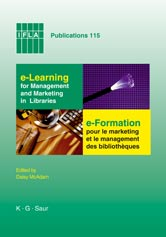This IFLA pre-satellite meeting of the Management & Marketing Section brought together a certain number of e-learning librarian specialists and was aimed at a public of mature information professionals, who came to take stock and report on the most recent developments in their fair.
The role of librarians has grown in a spectacular way, with the recent diversification of media, available not just on site, but more and more at a distance, thanks to the increasingly sophisticated electronic resources we have at our disposal. In order to intensify the use of all these new, often costly, resources, new strategies for training the "clients" of libraries have been set up.
Initially, in libraries we started with enquiry service; then came the proliferation of efficient reference services that put the know-how of professionals of their users with the philosophy "doing with, instead for". In the academic context, there was, on the one hand, the increasing number of students, with a more completive state of mind, sharpened by issues of success or failure, and on the other, the institutional will of making better use costly electronic resources, which finally gave rise to new training needs.
It is interesting to observe two parallel movements facing information retrieval. Firstly, we have countless new buildings throughout the western world, incorporating large areas of space, which offer the proximity of specific documentary collections alongside traditional and computerised work places as well as new meeting places for different level of users. At the University of Geneva, a professor who was closely involved into a preparation of a new scientific building, made the following rather apt comment: the library is "the lungs of the university". On the other hand, new projects of partnerships in networks or consortia to share common electronic resources are now inescapable.
The need to master information in the global environment of new technologies has brought about in training, chiefly in libraries, with its specialists in content management.
The contributors of these proceedings show the different levels of experience and pedagogical approaches: the confirmed experience of John Ellison, the taking into consideration of the information approach included in the vast study project described by Claude Besner and Hélène Sicotte, the realisation of e-learning products before their final 'publication', e.g. works of the Swiss Virtual Campus, the necessary of collaborating with academics, as Ailsa Nicholson demonstrates in Great-Britain, the issues of e-learning which integrate marketing developed at ENSSIB, France, etc. In short, two fundamentally different cultural approaches: the pragmatic know-how of Anglo-Saxons versus the cultural need of many French speakers to theorise.
e-Learning within a library environment is henceforth part of a new movement, encouraging more and more students to manage their studies in an autonomous way, with each progressing at their own rhythm.
Once more, librarians have shown that they are attuned to technological change, are able to call themselves into question, develop new skills and to be responsive to their clients' needs. In doing so, they bear witness to the fact that they are true actors in the information society.
Introduction by Daisy McAdam Published by K. G. Saur,
Daisy.McAdam@ses.unige.ch
University of Geneva
Switzerland
München 2005,
ISBN 3-598-21843-5